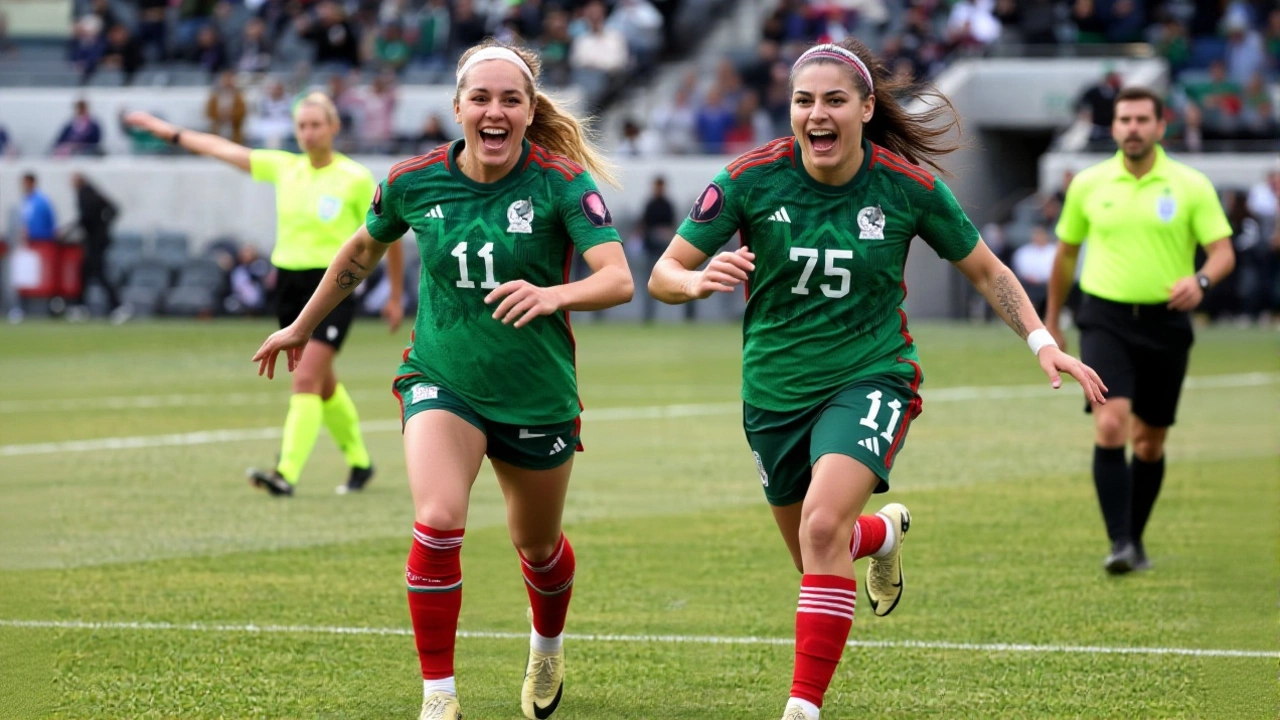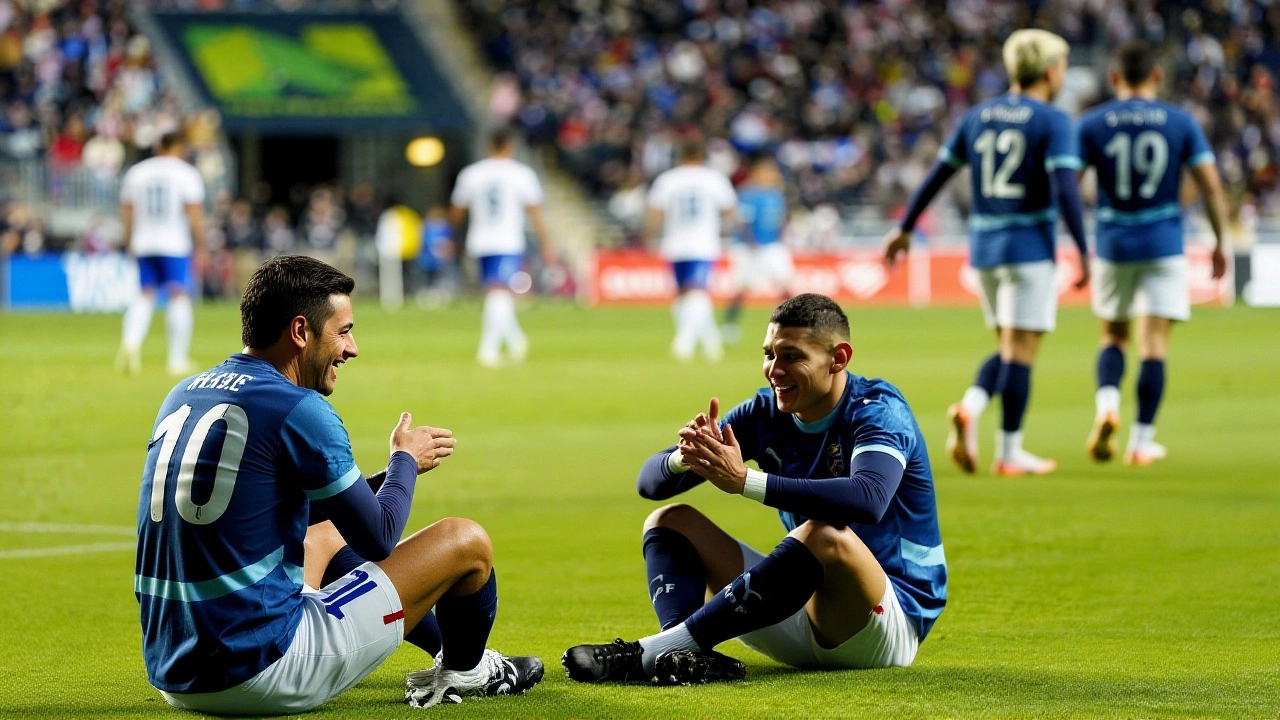Mexico’s national team, El Tri, ended 2025 on a sour note, losing 2-1 to Paraguay in a tense international friendly at the Alamodome in San Antonio, Texas on Wednesday, November 19, 2025. The match, broadcast live by Fox Deportes, wasn’t just another exhibition—it was the final curtain call for Mexico’s year of underwhelming performances, and the fans didn’t hold back. Boos rained down as the final whistle blew, continuing a pattern of growing frustration that’s turned what used to be a celebration of national pride into a tense, anxious watch. Coach José Javier Aguirre Orozco didn’t sugarcoat it. "They just don’t have enough," he said afterward, a blunt, almost weary admission that cut through the noise more than any tactical breakdown could.
A Penalty and a Promise That Faded
Mexico’s lone goal came from Raúl Jiménez, who calmly converted a penalty in the 65th minute after midfielder Carlos Pineda was brought down in the box. The moment briefly lit a fire under the Mexican bench—Jiménez’s 8th goal of the year, as commentators noted, tied the match at 1-1 and gave fans a fleeting sense of hope. But hope doesn’t win games. Paraguay, clinical and composed, struck back just 12 minutes later with a counterattack that exposed the same defensive gaps that have plagued Mexico all season. The second goal wasn’t spectacular—it was efficient. A low cross, a flick-on, and a finish that found the bottom corner. No heroics. Just cold execution.That’s what made it worse. Mexico didn’t lack effort; they lacked quality. The Fox Deportes broadcast transcript captured it perfectly: "ONLY THREAT IN THIS FIRST HALF FOR MEXICO" came from a corner kick that struck the post. For a team expected to dominate possession and create chances, that was a damning indictment. They had 57% of the ball but only two shots on target. Paraguay, by contrast, had three—two of them found the net.
Defensive Woes, Not Just Bad Luck
This wasn’t a fluke. It was the culmination of a pattern. According to Fox Deportes’ post-match analysis, Mexico had conceded eight goals across their six international fixtures in 2025. That’s an average of more than 1.3 per game. Against teams like Jamaica, Bolivia, and now Paraguay—none of whom are ranked in the top 30 globally—the defense looked disorganized, slow to recover, and strangely passive. "THEY DIDN’T IMPROVE DEFENSIVELY BUT THAT WASN’T ENOUGH TODAY," the commentary noted, a line that stuck with viewers because it wasn’t an excuse—it was a diagnosis.Even the midfield, usually Mexico’s engine, looked disconnected. Pineda, who won the penalty, was one of the few players who looked like he wanted to make a difference. But without consistent support, he was isolated. The fullbacks pushed forward too late, and the center-backs hesitated to step up. Paraguay’s striker, a 23-year-old who had never scored for his country before, found space behind Mexico’s back line twice. That’s not a bad day—it’s a systemic failure.
A New Face, But Not a New Direction
There was one bright spot: the international debut of González, a 21-year-old forward from Liga MX’s Tigres UANL. Broadcasters called him "THE TOP GOALSCORER NEXT TO PEDRO," referencing his club form, and he played 28 minutes in the second half. He didn’t score, but he pressed, ran channels, and forced one defensive error that nearly led to a goal. For a team starved of fresh ideas, his energy was a glimmer. But here’s the problem—he’s not the answer. He’s a symptom. A single debutant can’t fix a team that’s lost its identity. And with Aguirre openly questioning the squad’s talent level, the question isn’t whether González will play again—it’s whether anyone in this group is truly ready for the next level.
What’s Next? A World Cup Cycle in Crisis
Mexico now has less than 18 months before the 2026 World Cup, which they’ll host alongside the U.S. and Canada. That’s supposed to be their moment—their stage. But instead of building momentum, they’re digging themselves deeper. The last time they hosted a World Cup, in 1986, they reached the quarterfinals. Now, with a squad that looks like it’s playing for survival rather than glory, the pressure is mounting. Fans aren’t just disappointed—they’re angry. The boos in San Antonio weren’t random. They were the echo of a generation that remembers when El Tri was feared, not pitied.Other nations are moving forward. Canada, under John Herdman, has built a cohesive unit. The U.S. has a crop of MLS-bred stars who play with confidence. Even Jamaica, once a punchline, beat Mexico 2-1 in June. Mexico’s management has been slow to adapt. Too many players are still selected based on reputation, not performance. Too many coaches cling to outdated systems. Aguirre’s honesty was refreshing—but it’s not enough. He needs to be given the tools to rebuild, not just the blame for the mess.
Behind the Numbers: A Year of Decline
Let’s look at the facts: In 2025, Mexico played six friendlies. They won one, drew two, lost three. They scored seven goals. They conceded eight. Their average possession was 58%, but their expected goals (xG) per game was just 0.9. That’s worse than some CONCACAF rivals who play with far less control. Their best player, Jiménez, is 33 and playing through injury. Their captain, Andrés Guardado, retired after this match. The next generation? Unproven. Underwhelming. Unprepared.The Alamodome crowd of 48,200 wasn’t full of tourists. It was full of Mexican-Americans who still believe in El Tri. And they left silent. Not because they didn’t care—but because they didn’t recognize their team anymore.
Frequently Asked Questions
Why did Javier Aguirre say "They just don’t have enough"?
Aguirre’s comment was a direct response to the team’s lack of technical quality and decision-making under pressure. Despite controlling possession, Mexico failed to create clear chances, missed key passes, and showed poor defensive discipline. The phrase reflects his frustration that the squad lacks the individual talent or cohesion needed to compete at the highest level, especially with the 2026 World Cup looming.
How does this loss affect Mexico’s World Cup 2026 preparation?
As co-hosts, Mexico automatically qualifies, but this defeat exposes dangerous flaws that could cost them in knockout stages. With defensive vulnerabilities and a lack of attacking creativity, they risk being eliminated early despite home advantage. The team needs urgent tactical changes, new players, and a clear identity before competitive qualifiers begin in 2026.
Who is González, and why is his debut significant?
González, a 21-year-old forward from Tigres UANL, made his international debut against Paraguay after finishing as the second-highest scorer in Liga MX behind Javier "Pedro" Hernández. His energy and pressing style offered a rare spark, suggesting he could be part of Mexico’s next generation. But his debut also highlights the lack of depth—only one promising youngster got minutes in a high-stakes friendly.
What’s the history of Mexico vs. Paraguay in international matches?
Mexico leads the head-to-head record with 12 wins, 4 draws, and only 3 losses in 19 meetings since 1951. Their last meeting before this one was a 1-0 Mexico win in 2022. Paraguay’s 2025 victory was their first over Mexico in 14 years and only the third in over seven decades, making the result even more shocking for Mexican fans and analysts alike.
Why was the match played in San Antonio?
Mexico regularly plays friendlies in U.S. cities with large Mexican-American populations to maximize revenue and fan engagement. San Antonio, home to over 800,000 people of Mexican descent, has hosted El Tri six times since 2010. The Alamodome, with its 65,000-seat capacity, offers a neutral but culturally familiar environment that still feels like a home game.
What do experts say about Mexico’s future prospects?
Former Mexico captain Rafael Márquez told ESPN Deportes: "We’re not building a team—we’re patching one together." Analysts warn that without a long-term youth development overhaul and a shift away from club-based selection, Mexico risks becoming a tournament also-ran. The 2026 World Cup could be the last chance to reverse course before a new generation grows up without faith in El Tri.
